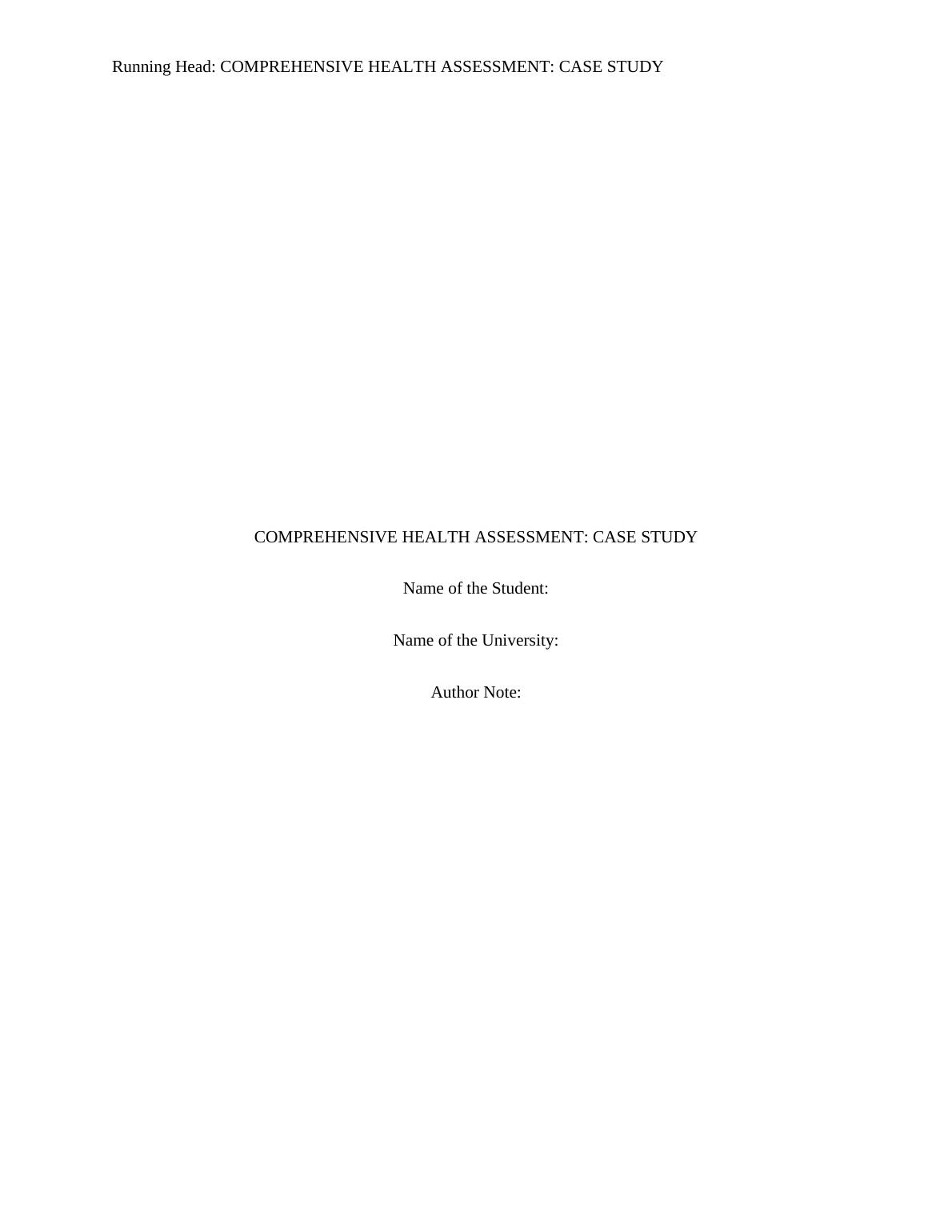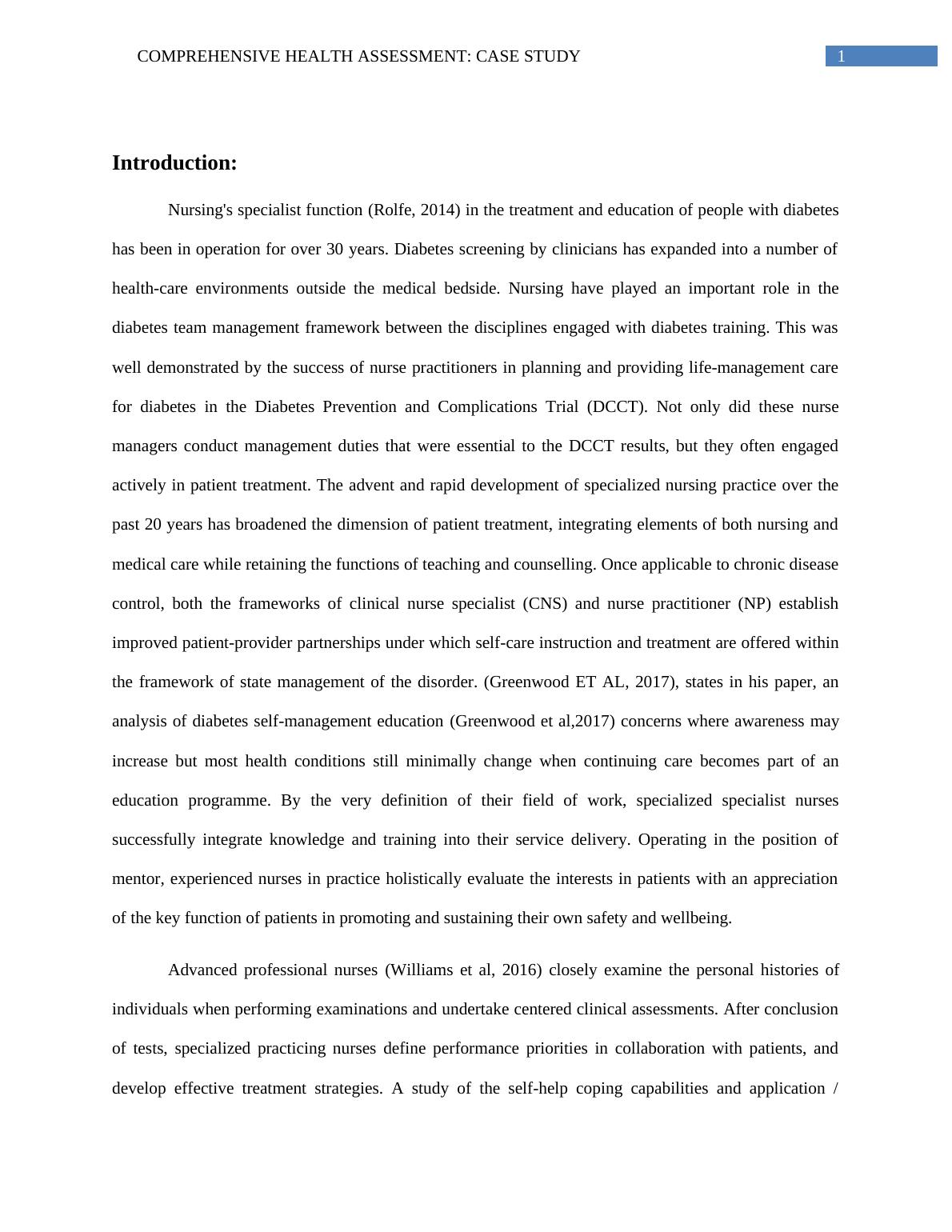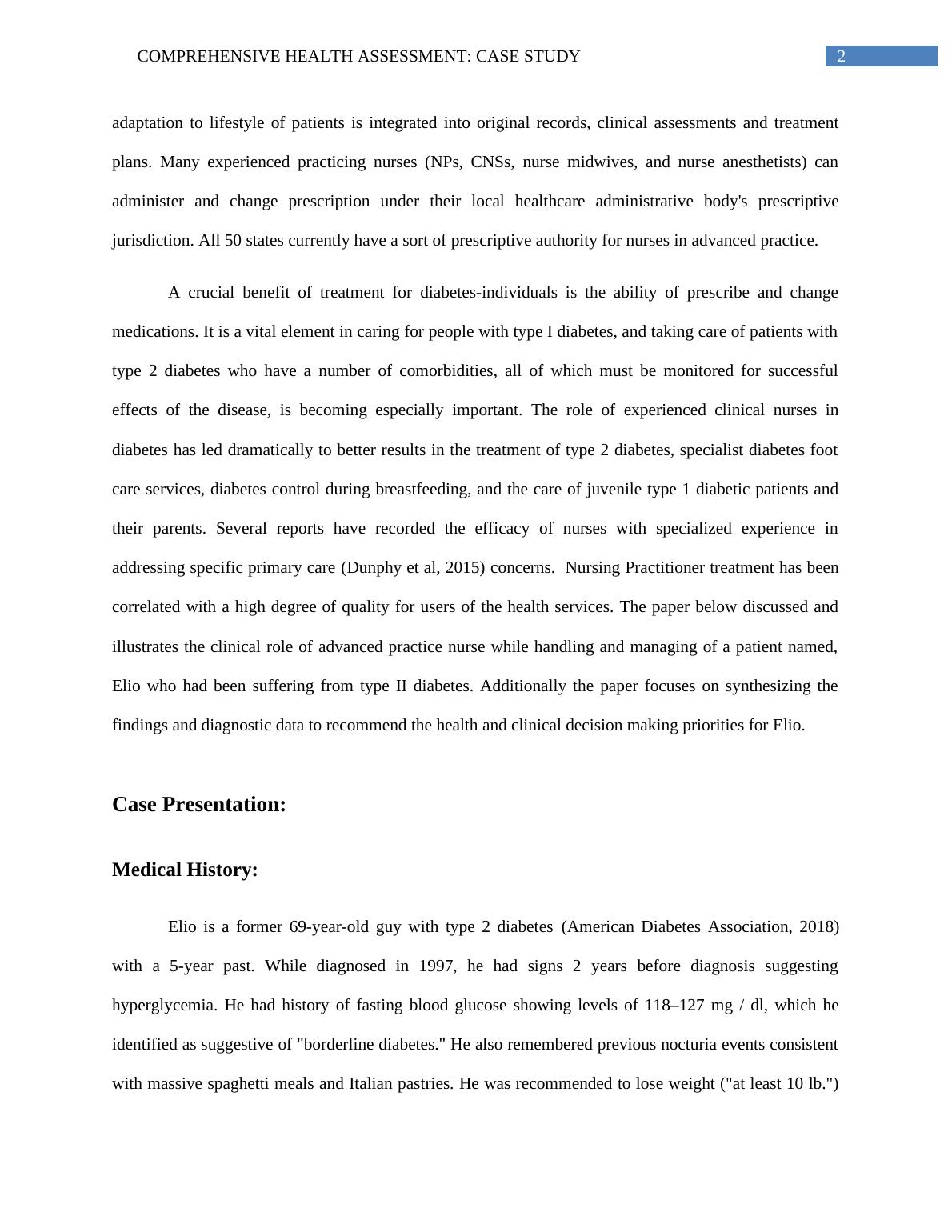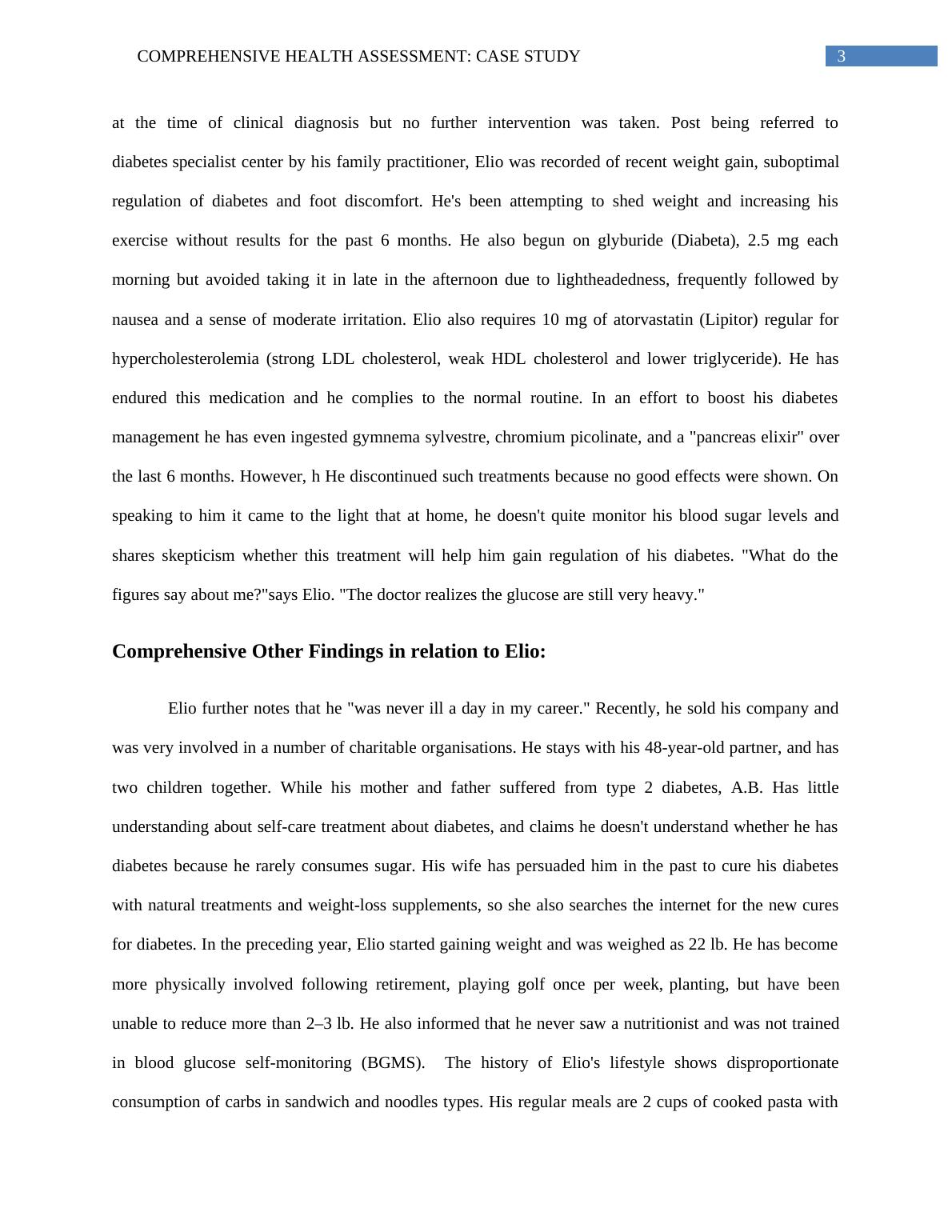Comprehensive Health Assessment | Case Study
Added on 2022-08-18
13 Pages4422 Words15 Views
Running Head: COMPREHENSIVE HEALTH ASSESSMENT: CASE STUDY
COMPREHENSIVE HEALTH ASSESSMENT: CASE STUDY
Name of the Student:
Name of the University:
Author Note:
COMPREHENSIVE HEALTH ASSESSMENT: CASE STUDY
Name of the Student:
Name of the University:
Author Note:

1COMPREHENSIVE HEALTH ASSESSMENT: CASE STUDY
Introduction:
Nursing's specialist function (Rolfe, 2014) in the treatment and education of people with diabetes
has been in operation for over 30 years. Diabetes screening by clinicians has expanded into a number of
health-care environments outside the medical bedside. Nursing have played an important role in the
diabetes team management framework between the disciplines engaged with diabetes training. This was
well demonstrated by the success of nurse practitioners in planning and providing life-management care
for diabetes in the Diabetes Prevention and Complications Trial (DCCT). Not only did these nurse
managers conduct management duties that were essential to the DCCT results, but they often engaged
actively in patient treatment. The advent and rapid development of specialized nursing practice over the
past 20 years has broadened the dimension of patient treatment, integrating elements of both nursing and
medical care while retaining the functions of teaching and counselling. Once applicable to chronic disease
control, both the frameworks of clinical nurse specialist (CNS) and nurse practitioner (NP) establish
improved patient-provider partnerships under which self-care instruction and treatment are offered within
the framework of state management of the disorder. (Greenwood ET AL, 2017), states in his paper, an
analysis of diabetes self-management education (Greenwood et al,2017) concerns where awareness may
increase but most health conditions still minimally change when continuing care becomes part of an
education programme. By the very definition of their field of work, specialized specialist nurses
successfully integrate knowledge and training into their service delivery. Operating in the position of
mentor, experienced nurses in practice holistically evaluate the interests in patients with an appreciation
of the key function of patients in promoting and sustaining their own safety and wellbeing.
Advanced professional nurses (Williams et al, 2016) closely examine the personal histories of
individuals when performing examinations and undertake centered clinical assessments. After conclusion
of tests, specialized practicing nurses define performance priorities in collaboration with patients, and
develop effective treatment strategies. A study of the self-help coping capabilities and application /
Introduction:
Nursing's specialist function (Rolfe, 2014) in the treatment and education of people with diabetes
has been in operation for over 30 years. Diabetes screening by clinicians has expanded into a number of
health-care environments outside the medical bedside. Nursing have played an important role in the
diabetes team management framework between the disciplines engaged with diabetes training. This was
well demonstrated by the success of nurse practitioners in planning and providing life-management care
for diabetes in the Diabetes Prevention and Complications Trial (DCCT). Not only did these nurse
managers conduct management duties that were essential to the DCCT results, but they often engaged
actively in patient treatment. The advent and rapid development of specialized nursing practice over the
past 20 years has broadened the dimension of patient treatment, integrating elements of both nursing and
medical care while retaining the functions of teaching and counselling. Once applicable to chronic disease
control, both the frameworks of clinical nurse specialist (CNS) and nurse practitioner (NP) establish
improved patient-provider partnerships under which self-care instruction and treatment are offered within
the framework of state management of the disorder. (Greenwood ET AL, 2017), states in his paper, an
analysis of diabetes self-management education (Greenwood et al,2017) concerns where awareness may
increase but most health conditions still minimally change when continuing care becomes part of an
education programme. By the very definition of their field of work, specialized specialist nurses
successfully integrate knowledge and training into their service delivery. Operating in the position of
mentor, experienced nurses in practice holistically evaluate the interests in patients with an appreciation
of the key function of patients in promoting and sustaining their own safety and wellbeing.
Advanced professional nurses (Williams et al, 2016) closely examine the personal histories of
individuals when performing examinations and undertake centered clinical assessments. After conclusion
of tests, specialized practicing nurses define performance priorities in collaboration with patients, and
develop effective treatment strategies. A study of the self-help coping capabilities and application /

2COMPREHENSIVE HEALTH ASSESSMENT: CASE STUDY
adaptation to lifestyle of patients is integrated into original records, clinical assessments and treatment
plans. Many experienced practicing nurses (NPs, CNSs, nurse midwives, and nurse anesthetists) can
administer and change prescription under their local healthcare administrative body's prescriptive
jurisdiction. All 50 states currently have a sort of prescriptive authority for nurses in advanced practice.
A crucial benefit of treatment for diabetes-individuals is the ability of prescribe and change
medications. It is a vital element in caring for people with type I diabetes, and taking care of patients with
type 2 diabetes who have a number of comorbidities, all of which must be monitored for successful
effects of the disease, is becoming especially important. The role of experienced clinical nurses in
diabetes has led dramatically to better results in the treatment of type 2 diabetes, specialist diabetes foot
care services, diabetes control during breastfeeding, and the care of juvenile type 1 diabetic patients and
their parents. Several reports have recorded the efficacy of nurses with specialized experience in
addressing specific primary care (Dunphy et al, 2015) concerns. Nursing Practitioner treatment has been
correlated with a high degree of quality for users of the health services. The paper below discussed and
illustrates the clinical role of advanced practice nurse while handling and managing of a patient named,
Elio who had been suffering from type II diabetes. Additionally the paper focuses on synthesizing the
findings and diagnostic data to recommend the health and clinical decision making priorities for Elio.
Case Presentation:
Medical History:
Elio is a former 69-year-old guy with type 2 diabetes (American Diabetes Association, 2018)
with a 5-year past. While diagnosed in 1997, he had signs 2 years before diagnosis suggesting
hyperglycemia. He had history of fasting blood glucose showing levels of 118–127 mg / dl, which he
identified as suggestive of "borderline diabetes." He also remembered previous nocturia events consistent
with massive spaghetti meals and Italian pastries. He was recommended to lose weight ("at least 10 lb.")
adaptation to lifestyle of patients is integrated into original records, clinical assessments and treatment
plans. Many experienced practicing nurses (NPs, CNSs, nurse midwives, and nurse anesthetists) can
administer and change prescription under their local healthcare administrative body's prescriptive
jurisdiction. All 50 states currently have a sort of prescriptive authority for nurses in advanced practice.
A crucial benefit of treatment for diabetes-individuals is the ability of prescribe and change
medications. It is a vital element in caring for people with type I diabetes, and taking care of patients with
type 2 diabetes who have a number of comorbidities, all of which must be monitored for successful
effects of the disease, is becoming especially important. The role of experienced clinical nurses in
diabetes has led dramatically to better results in the treatment of type 2 diabetes, specialist diabetes foot
care services, diabetes control during breastfeeding, and the care of juvenile type 1 diabetic patients and
their parents. Several reports have recorded the efficacy of nurses with specialized experience in
addressing specific primary care (Dunphy et al, 2015) concerns. Nursing Practitioner treatment has been
correlated with a high degree of quality for users of the health services. The paper below discussed and
illustrates the clinical role of advanced practice nurse while handling and managing of a patient named,
Elio who had been suffering from type II diabetes. Additionally the paper focuses on synthesizing the
findings and diagnostic data to recommend the health and clinical decision making priorities for Elio.
Case Presentation:
Medical History:
Elio is a former 69-year-old guy with type 2 diabetes (American Diabetes Association, 2018)
with a 5-year past. While diagnosed in 1997, he had signs 2 years before diagnosis suggesting
hyperglycemia. He had history of fasting blood glucose showing levels of 118–127 mg / dl, which he
identified as suggestive of "borderline diabetes." He also remembered previous nocturia events consistent
with massive spaghetti meals and Italian pastries. He was recommended to lose weight ("at least 10 lb.")

3COMPREHENSIVE HEALTH ASSESSMENT: CASE STUDY
at the time of clinical diagnosis but no further intervention was taken. Post being referred to
diabetes specialist center by his family practitioner, Elio was recorded of recent weight gain, suboptimal
regulation of diabetes and foot discomfort. He's been attempting to shed weight and increasing his
exercise without results for the past 6 months. He also begun on glyburide (Diabeta), 2.5 mg each
morning but avoided taking it in late in the afternoon due to lightheadedness, frequently followed by
nausea and a sense of moderate irritation. Elio also requires 10 mg of atorvastatin (Lipitor) regular for
hypercholesterolemia (strong LDL cholesterol, weak HDL cholesterol and lower triglyceride). He has
endured this medication and he complies to the normal routine. In an effort to boost his diabetes
management he has even ingested gymnema sylvestre, chromium picolinate, and a "pancreas elixir" over
the last 6 months. However, h He discontinued such treatments because no good effects were shown. On
speaking to him it came to the light that at home, he doesn't quite monitor his blood sugar levels and
shares skepticism whether this treatment will help him gain regulation of his diabetes. "What do the
figures say about me?"says Elio. "The doctor realizes the glucose are still very heavy."
Comprehensive Other Findings in relation to Elio:
Elio further notes that he "was never ill a day in my career." Recently, he sold his company and
was very involved in a number of charitable organisations. He stays with his 48-year-old partner, and has
two children together. While his mother and father suffered from type 2 diabetes, A.B. Has little
understanding about self-care treatment about diabetes, and claims he doesn't understand whether he has
diabetes because he rarely consumes sugar. His wife has persuaded him in the past to cure his diabetes
with natural treatments and weight-loss supplements, so she also searches the internet for the new cures
for diabetes. In the preceding year, Elio started gaining weight and was weighed as 22 lb. He has become
more physically involved following retirement, playing golf once per week, planting, but have been
unable to reduce more than 2–3 lb. He also informed that he never saw a nutritionist and was not trained
in blood glucose self-monitoring (BGMS). The history of Elio's lifestyle shows disproportionate
consumption of carbs in sandwich and noodles types. His regular meals are 2 cups of cooked pasta with
at the time of clinical diagnosis but no further intervention was taken. Post being referred to
diabetes specialist center by his family practitioner, Elio was recorded of recent weight gain, suboptimal
regulation of diabetes and foot discomfort. He's been attempting to shed weight and increasing his
exercise without results for the past 6 months. He also begun on glyburide (Diabeta), 2.5 mg each
morning but avoided taking it in late in the afternoon due to lightheadedness, frequently followed by
nausea and a sense of moderate irritation. Elio also requires 10 mg of atorvastatin (Lipitor) regular for
hypercholesterolemia (strong LDL cholesterol, weak HDL cholesterol and lower triglyceride). He has
endured this medication and he complies to the normal routine. In an effort to boost his diabetes
management he has even ingested gymnema sylvestre, chromium picolinate, and a "pancreas elixir" over
the last 6 months. However, h He discontinued such treatments because no good effects were shown. On
speaking to him it came to the light that at home, he doesn't quite monitor his blood sugar levels and
shares skepticism whether this treatment will help him gain regulation of his diabetes. "What do the
figures say about me?"says Elio. "The doctor realizes the glucose are still very heavy."
Comprehensive Other Findings in relation to Elio:
Elio further notes that he "was never ill a day in my career." Recently, he sold his company and
was very involved in a number of charitable organisations. He stays with his 48-year-old partner, and has
two children together. While his mother and father suffered from type 2 diabetes, A.B. Has little
understanding about self-care treatment about diabetes, and claims he doesn't understand whether he has
diabetes because he rarely consumes sugar. His wife has persuaded him in the past to cure his diabetes
with natural treatments and weight-loss supplements, so she also searches the internet for the new cures
for diabetes. In the preceding year, Elio started gaining weight and was weighed as 22 lb. He has become
more physically involved following retirement, playing golf once per week, planting, but have been
unable to reduce more than 2–3 lb. He also informed that he never saw a nutritionist and was not trained
in blood glucose self-monitoring (BGMS). The history of Elio's lifestyle shows disproportionate
consumption of carbs in sandwich and noodles types. His regular meals are 2 cups of cooked pasta with

End of preview
Want to access all the pages? Upload your documents or become a member.
Related Documents
FOUNDATION OF NURSING PRACTICE AND SIGNIFICANCElg...
|6
|1484
|15
Role of Nurse Practitioners in Renal Care: Skills, Challenges and Standardslg...
|11
|3737
|81
Role, Skills and Challenges of Nurse Practitioners in Dermatology Clinical Speciality Fieldlg...
|10
|3240
|379
Assignment | Role of the Nurse Practitioner as a Health Educatorlg...
|7
|1905
|17
Nursing Assignment | Nurse Practitioners and Clinical Nurse Specialistslg...
|13
|3214
|153
Role of Nurse Practitioners in Healthcare Systemlg...
|12
|3647
|82
